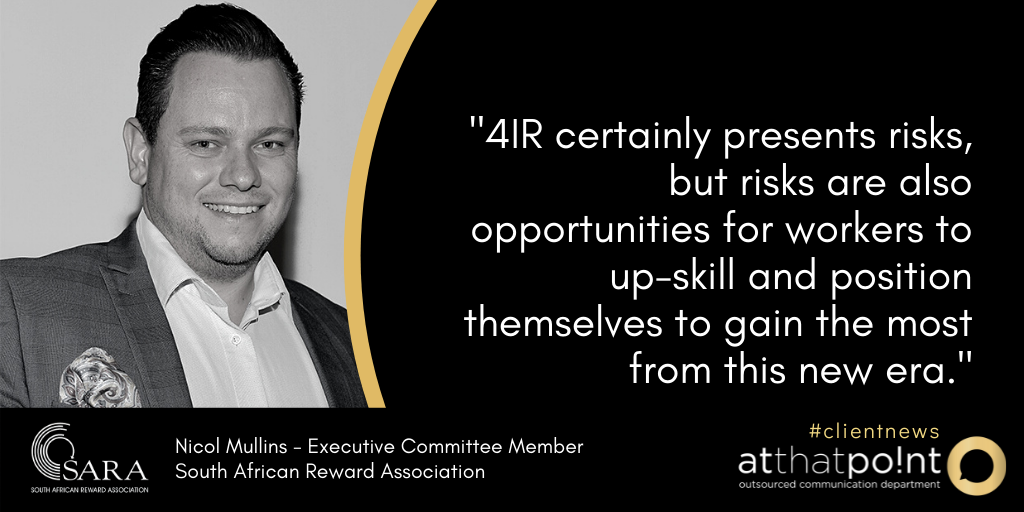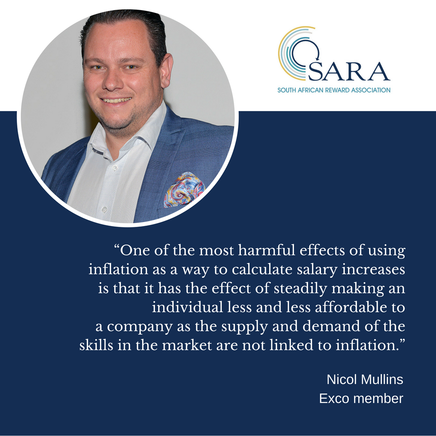 “The Fourth Industrial Revolution is about the acceleration of innovation and the velocity of disruption, and these two factors are creating disruption and along with this, new opportunities for business,” says Nicol Mullins, Chartered Reward Specialist and Executive Committee Member at the South African Reward Association (SARA). He observes that Covid-19 has served as a catalyst for the adoption of Fourth Industrial Revolution (4IR) technologies, along with forcing the development of new business models or the adaptation of existing ones. This trend is also redefining the approach employers take to remuneration and reward. A New Perspective on Reward “4IR certainly presents risks, but risks are also opportunities for workers to upskill and position themselves to gain the most from this new era,” says Mullins. This is especially true of the massive global move towards the virtual workplace, with many employees now working exclusively from home and connecting with their organisations, teams and managers digitally. Most organisations have pivoted rapidly to this new normal while others have not been as quick to transition. Either way, businesses are reviewing their strategic outlook based on a new set of challenges they face and resources now available to them due to the automation of repetitive, routine processes. “Reward strategies must likewise be adapted to complement this new paradigm and align with reimagined business strategies to contribute the highest value to their achievement,” says Mullins. Expanded Talent Possibilities An important effect of digitalisation is that talent sourcing and recruitment in a virtual world is not restricted by national borders. Or to humans. Instead, 4IR is blurring the boundaries between the physical, digital and biological, allowing organisations to draw from a worldwide pool of talent and specialisation. Resources no longer need to be situated locally but can contribute to corporate outcomes from anywhere on the planet. Because of this, reward strategies are shifting from an internal-only focus to include external parties as well. While companies have long followed a build, borrow or buy approach to talent planning and acquisition, borrowing is coming to the fore. “Organisations can more readily direct work to underutilised personnel without being constrained by departmental or divisional boundaries, resulting in greater efficiency and productivity,” says Mullins. Similarly, freelancers can be more seamlessly integrated into business processes to tackle activities that require professional attention, but not so frequently as to justify permanent staff. Better Reward Strategies As they embrace virtual workspaces, a more fluid talent mix and flexible work assignments, organisations must also determine how rewards should be structured for both internal and external staff requirements. For short term assignments, freelancers may be considered vendors who bill clients for their work and manage their own benefits and work-life balance. For long term contractors, especially those offering scarce or critical skills, a viable reward policy should be investigated. Employers may also consider hiring out specialist staff to other organisations, earning extra income when their workload is low. Embracing a sharing economy. How to design and implement remuneration and reward programmes appropriate to these dynamics falls squarely within the purview of the reward specialist. “Now is the ideal time for organisations to engage closely with their reward practitioners, whether inhouse or outsourced, and involve them more deeply in workforce planning and strategy,” says Mullins. ENDS MEDIA CONTACT: Idéle Prinsloo, 082 573 9219, [email protected], www.atthatpoint.co.za For more information on SARA please visit: Website: www.sara.co.za Twitter: @SA_reward LinkedIn: South African Reward Association Facebook: SARA – South African Reward Association
0 Comments
Inflation is typically used as the basis for calculating annual salary increases. But inflation is a poor guide for working out how to reward employees to ensure competitiveness when compared to the market, says Nicol Mullins, Exco member of the South African Reward Association (SARA) and Principal Consultant at Mercer South Africa.
Instead of inflation, he argues, employers need to take various other factors into account when calculating salary increases. If not, they can end up disadvantaging both employee and employer as well as, potentially, shareholders. “Using consumer price inflation (CPI) as a basis for calculating salary increases just does not make sense,” Mr Mullins says. “Inflation figures vary from one source to another and are far from perfect. Even if they were reliable, there is no logical reason why they should affect an individual’s salary. It makes much better business sense to use a scientific, evidence-based methodology for calculating salary increases that is based on what a particular role commands in the marketplace.” Inflation-based increases are not sustainable The fundamental point to understand is that a salary is paid to compensate an individual for doing a job. Therefore, a salary is actually dictated by the supply and demand of that particular skill, not what the inflation was for that year or the following. Even if one insisted on using CPI as a basis for this calculation, one should logically only apply it to that portion of the salary that is used to buy goods and services that are inflation-linked. Mr Mullins says that a valid argument could be made that employers should be protecting the purchasing power of employees, especially those at the lowest level. But this argument is somewhat negated by the fact that when such workers are employed, they are offered as low a wage as possible. “One of the most harmful effects of using inflation as a way to calculate salary increases is that it has the effect of steadily making an individual less and less affordable to a company as the supply and demand of the skills in the market are not linked to inflation. In turn, this means either that the company has to pay more than it needs to in remuneration, or the employee becomes too expensive” he says. “Neither of these outcomes is desirable. Rather, we want to determine what is externally competitive while ensuring internal equity.” Increases should consider across-the-board relevance Mr Mullins advises that the salary discussion should fall into two distinct sections: how all the salaries across the company should be increased, resulting in an overall salary increase budget; and then what increases should be granted on an individual basis to align those employees to their optimal placement within the company pay ranges where there is currently misalignment to the pay policy. The across-the-board salary increases budget should be related to supply and demand of the particular role, whereas the merit increases are based on individual alignment to ensure that salaries are aligned with the internal pay policy. For calculating salary increases, Mr Mullins advises following a logical methodology that looks at what the fair, market-related recompense would be, and what the overall budget for increases actually is. The process begins by determining what the market rate of pay for each role, grade or function is. As part of this process, the company’s own pay structure/scale or bands should be compared with market data. This step is known as the range-adjustment factor. The above adjustment should be made after taking into consideration the market-adjustment factor which in essence is the predicted movement of the market from when the data was collected to when the increases are going to take effect. Guidance on this should be provided by the company lead/lag policy. The company must then decide how it will adjust its salary bands to align with the market. The company needs to determine the range adjustment factor; how much budget it will assign towards adjusting to the market rate. Increases should consider individual employees Obviously, companies want to pay at the market rate. The next step must be to look at those employees who are being paid below the current company guidelines. Some of them will be new hires or inexperienced, but others will need to be adjusted upwards. A separate budget needs to be determined for this exercise – this is known as the equity-adjustment factor. The next step is to determine a promotion budget. Companies can make an assumption based on historical data that, for example, 2 percent of their employees will be promoted and receive 15 percent salary increases. By following this approach an organisation outlines their promotional increase factor. At a practical level, Mr Mullins advises that companies should consider adding unspent HR budget from the previous year to the budget for current year salary increases – this is known as recovery. The final step would be to consider merit increases. This is the process of aligning employee compa-ratios to their internal grading structure after the range adjustments have been taken into consideration. “Such an approach has the advantage of being based on market realities and is thus sustainable. And because it is scientific and evidence-based, it can be shown to be fair, with a positive impact on employee morale and engagement,” Mr Mullins concludes. “Just giving everybody a blanket increase each year based on inflation sets unrealistic expectations; this method forces employees and employers to confront the reality that the market dictates business profitability, and thus job security.” ENDS MEDIA CONTACT: Juanita Vorster, 079 523 8374, [email protected], www.atthatpoint.co.za For more information on SARA please visit: Website: www.sara.co.za Twitter: @SA_reward LinkedIn: South African Reward Association Facebook: SARA – South African Reward Association |
Archives
March 2023
Welcome to the South African Reward Association newsroom.
Categories
All
|


 RSS Feed
RSS Feed